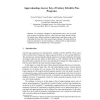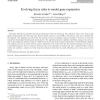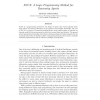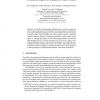1003 search results - page 13 / 201 » Proposal of Generalized Rule Programming Model |
124
click to vote
LPNMR
2005
Springer
15 years 7 months ago
2005
Springer
We investigate techniques for approximating answer sets of general logic programs of Lifschitz and Woo, whose rules have single literals as heads. We propose three different method...
128
click to vote
BIOSYSTEMS
2007
15 years 2 months ago
2007
This paper develops an algorithm that extracts explanatory rules from microarray data, which we treat as time series, using genetic programming (GP) and fuzzy logic. Reverse polis...
113
click to vote
CORR
2004
Springer
15 years 2 months ago
2004
Springer
FLUX is a programming method for the design of agents that reason logically about their actions and sensor information in the presence of incomplete knowledge. The core of FLUX is...
115
Voted
LPNMR
2007
Springer
15 years 8 months ago
2007
Springer
Practically all programming languages used in software engineering allow to split a program into several modules. For fully declarative and nonmonotonic logic programming languages...
163
click to vote
RULEML
2010
Springer
15 years 22 days ago
2010
Springer
Rule bases are common in many business rule applications, clinical decision support programs, and other types of intelligent systems. As the size of the rule bases grows and the in...




